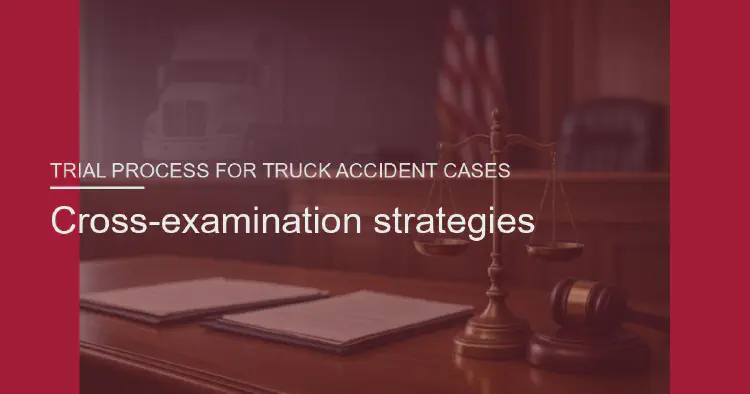Cross-examination strategies
Cross-examination is one of the most powerful tools in a truck accident trial. It allows attorneys to test the credibility of witnesses and highlight weaknesses in the opposing side’s case.
- Truck Accident Law Team
- 2 min read
Article 4 of 6 in Trial Process for Truck Accident Cases/

Cross-Examination Strategies in Truck Accident Trials
Purpose of Cross-Examination
- Challenge the accuracy and credibility of witness testimony.
- Expose inconsistencies or biases.
- Reinforce the questioning attorney’s theory of the case.
Common Strategies
-
Impeachment with Prior Statements
- Pointing out contradictions between a witness’s testimony and earlier statements (e.g., police reports, depositions).
-
Highlighting Bias or Interest
- Showing that an expert witness is paid by the defense or has ties to the trucking company.
- Demonstrating personal stakes in the case outcome.
-
Limiting Scope of Testimony
- Narrowing a witness’s expertise or knowledge to prevent overreach.
- Example: A mechanic testifying on maintenance cannot speculate on driver fatigue.
-
Yes-or-No Questions
- Using leading questions that restrict the witness to confirming or denying facts.
- Keeps control in the attorney’s hands and avoids lengthy explanations.
-
Exposing Gaps in Knowledge
- Showing that eyewitnesses had poor visibility, distractions, or limited perspectives.
- Undermines reliability of their account.
-
Challenging Expert Testimony
- Questioning methodology, assumptions, or credentials.
- Introducing conflicting expert opinions.
Special Considerations in Truck Accident Cases
- Technical Evidence: Cross-examination may focus on black box data, ELD logs, or compliance with FMCSA regulations.
- Complex Witnesses: Trucking company officials, mechanics, and medical experts may provide detailed testimony requiring targeted questioning.
Risks of Cross-Examination
- Overly aggressive questioning can alienate jurors.
- Poor preparation may allow the witness to reinforce their credibility.
- Effective cross-examination requires balance, precision, and control.
Summary: Cross-examination is critical for testing witness credibility and undermining opposing arguments in truck accident trials. By exposing inconsistencies and highlighting weaknesses, attorneys shape how jurors interpret the evidence.
You might also like:
- Tags:
- Black Box
- Expert Testimony
- Trucking Company
- Box Data
- Police Reports
- Driver Fatigue
- Expert Witness
- Cross Examination
- Accident Trials
- Fmcsa Regulations
- Witness Testimony
- Medical Experts
- Compliance Fmcsa
- Eld Logs
- Experts Provide
- Company Officials
- Black Box Data
- Truck Accident Trials
- Accident Trials Purpose
- Statements Police Reports
- Considerations Truck Accident
- Medical Experts Provide
- Strategies Truck Accident
- Arguments Truck Accident
- Jurors Interpret Evidence
- Mechanics Medical Experts